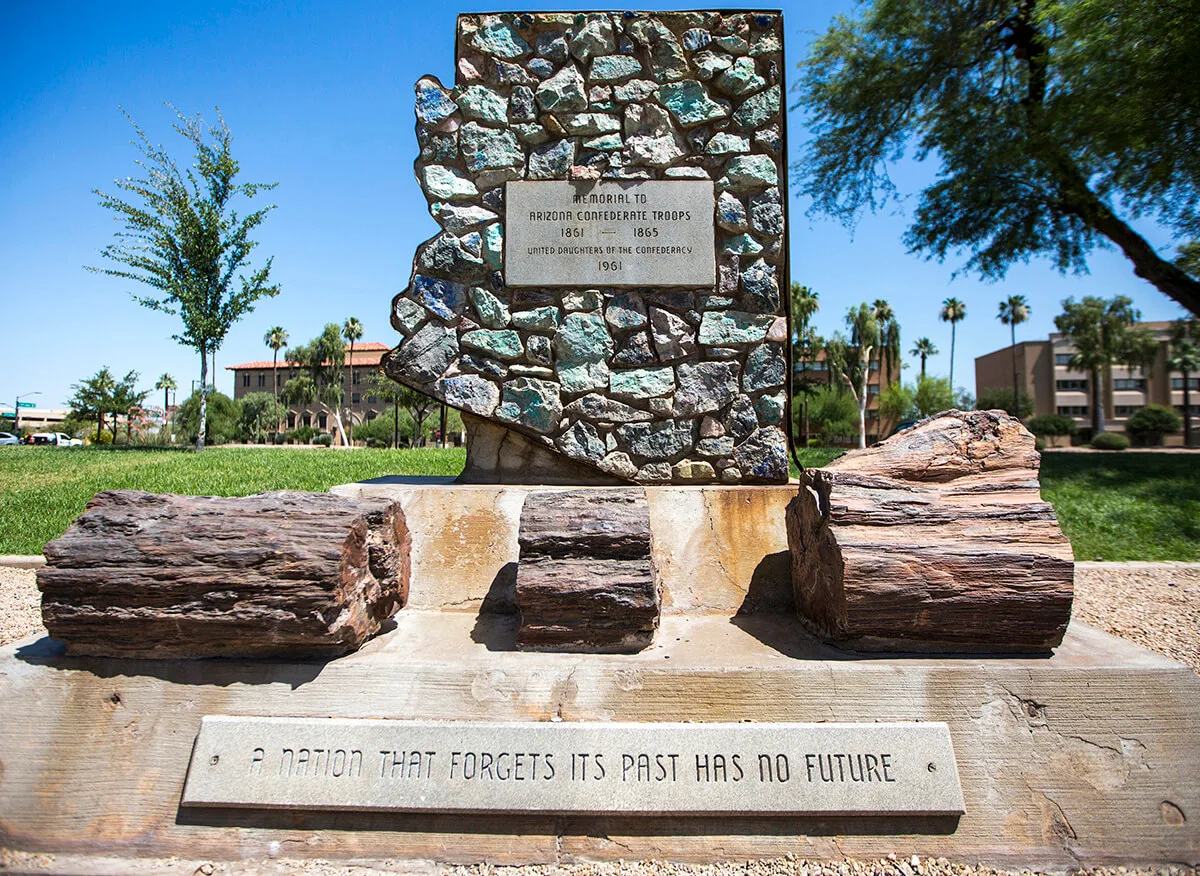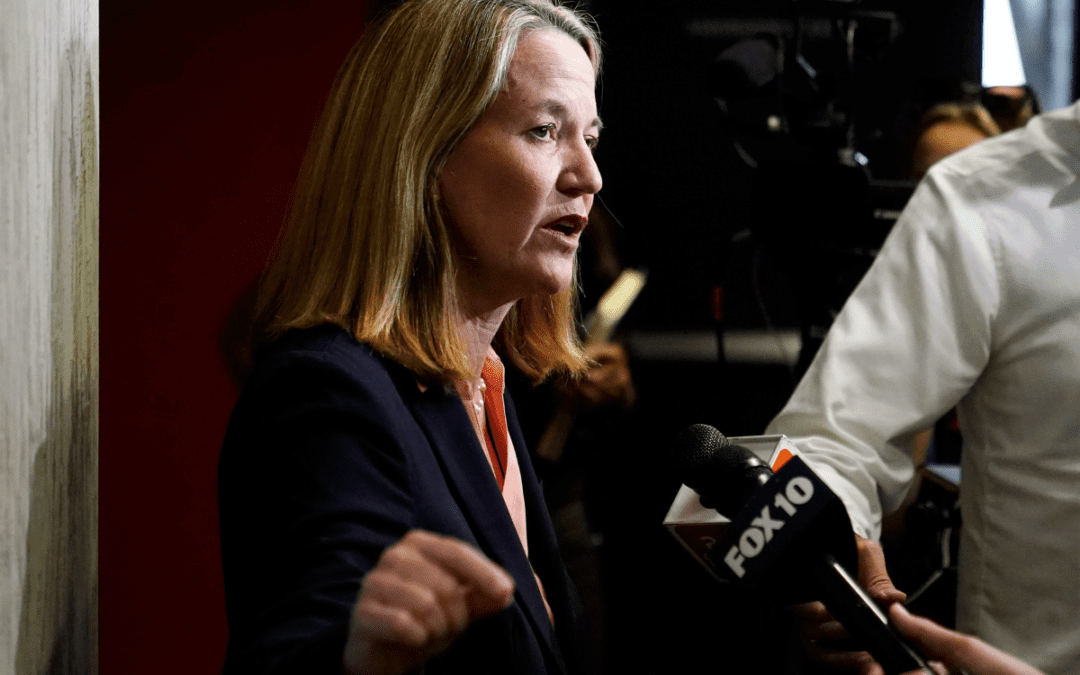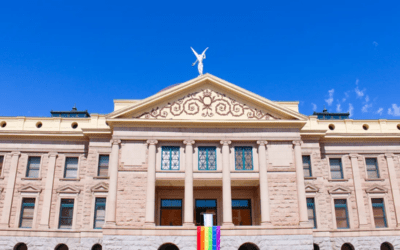
A monument to Arizona Confederate soldiers stands amid other memorials at Wesley Bonin Memorial Plaza on the grounds of the Capitol complex in Phoenix Monday, June 5, 2017, presented by the United Daughters of the Confederacy in 1961. Black leaders in Arizona are pushing Republican Gov. Doug Ducey to remove the monuments on public land that they say are offensive and glorify the country's racist past. The push comes as communities along the South wrestle with whether to keep longstanding symbols of the Confederacy. (AP Photo/Angie Wang)
“Removing this monument isn’t a choice to erase our history, it’s a choice to embrace our future.”
Protests against racial injustice sweeping across the country and the world have renewed the debate over why some states still display memorials to the Confederate States of America.
The civil unrest has led some states and other organizations to take action in recent weeks. Virginia Gov. Ralph Northam announced the state would remove a state of Gen. Robert E. Lee in Richmond, and protesters toppled a statue of Confederate President Jefferson Davis there Wednesday. The University of Alabama also committed to taking down memorials to Confederate soldiers. The U.S. Marine Corps (and NASCAR!) announced a ban on public displays of the Confederate battle flag.
And in Arizona, Secretary of State Katie Hobbs is calling for a memorial outside the state Capitol to be removed.
In a letter to the director of the state’s Department of Administration, Hobbs said the monument is “undeserving” of its placement next to tributes to leaders like Martin Luther King Jr., Navajo Codetalkers, and the Granite Mountain Hotshots.
The memorial was gifted to the state by the United Daughters of the Confederacy — a group that has received scrutiny for its skewed retelling of history, including claims that the role slavery played in the Civil War is overstated.
Historians have pointed out that many memorials to the Confederacy were not installed immediately after the war’s conclusion – rather, they were erected during times when racial tensions were high. Arizona’s memorial at the Capitol, as well as the naming of Robert E. Lee Street, were dedicated in the early 1960s, in the middle of the civil rights movement.
RELATED: A CEO, Former Cop, and Mom. Here Are Some of the Arizonans Who Support the Protests.
“Removing this monument isn’t a choice to erase our history, it’s a choice to embrace our future,” Hobbs said in a tweet Monday.
Besides the Capitol monument, there are at least four other Confederate memorials in Arizona, according to data compiled by the Southern Poverty Law Center.
Those are:
- Jefferson Davis Highway Marker in Gold Canyon
- East Robert E. Lee Street in Phoenix
- Confederate Memorial in Picacho
- Picacho Peak Confederate Monument in Picacho
Arizona was not yet a state during the Civil War, but it does have some ties to the conflict. The two monuments in Picacho, an unincorporated community about 60 miles southeast of Phoenix, are at the site of the westernmost Civil War clash, the Battle of Picacho Pass.
The Arizona Republic has also reported on a monument for Confederate soldiers at Dragoon Springs near Tucson, an Arizona Confederate veterans’ memorial in Sierra Vista, and another memorial to Confederate veterans in a Phoenix cemetery.
There is an online petition calling for the removal of all Confederate memorials on Arizona public land, as well as a petition specific to the removal of Capitol monument.
A Longstanding Controversy
Black leaders have fought for years to remove these Confederate memorials throughout the state.
In 2017, after a man drove into a crowd of people protesting racism in North Carolina, East Valley NAACP spokeswoman Collette Watson said the symbols “intimidate, terrorize and strike fear in the hearts of Arizonans, particularly African-Americans, while inspiring and emboldening white supremacists.”
State Rep. Reginald Bolding, D-Laveen, has been calling for the Capitol memorial’s removal since 2015, after a white supremacist fatally shot nine Black people in a South Carolina church.
Gov. Doug Ducey has said he has no interest in taking down Confederate memorials, as he sees them as important nods to history.
But Hobbs argues history is present enough in racial inequality.
“Without a doubt, the most shameful moments of our history should not be forgotten,” she said. “But we need not honor these shameful moments in order to remember them.”
Democratic leaders in the state have spoken out in support of Hobbs’ request, including Superintendent of Public Instruction Kathy Hoffman and multiple state lawmakers.
According to The Arizona Republic, the Department of Administration acknowledged it received Hobbs’ letter but has not yet taken a position on the issue.
Trump Wants Them Up
Despite an outpouring of calls for the federal government to rename Army bases named after Confederate leaders, President Donald Trump said Wednesday his administration will “not even consider” it.
“These Monumental and very Powerful Bases have become part of a Great American Heritage, a history of Winning, Victory, and Freedom,” Trump said on Twitter.
Not all military leaders shared this idea. Name changes have not been proposed by the Army or the Pentagon, but on Monday, Defense Secretary Mark Esper and Army Secretary Ryan McCarthy indicated in response to questions from reporters that they were “open to a bipartisan discussion” of renaming bases such as Fort Bragg in North Carolina and Fort Benning in Georgia.
Paul Eaton, a retired two-star Army general and a former commanding general of Fort Benning, said Trump’s statements go against ideals the Army stands for.
“Today, Donald Trump made it official. Rather than move this nation further away from institutionalized racism, he believes we should cling to it and its heritage, by keeping the names of racist traitors on the gates of our military bases,” Eaton said.
Peter Mansoor, a retired Army colonel and veteran of the Iraq war, said in an email exchange that renaming these bases is long overdue.
“Most serving soldiers know little about the history behind the Confederate leaders for whom these bases are named, or the political deals that caused them to be honored in this fashion,” he said. “There might be some pushback from a small segment of soldiers from the South, but this is what we like to call a ‘teachable moment.’ Now is the time to finally bring about a change that will speak volumes as to what the U.S. Army stands for.”
The Associated Press contributed to this report.
Support Our Cause
Thank you for taking the time to read our work. Before you go, we hope you'll consider supporting our values-driven journalism, which has always strived to make clear what's really at stake for Arizonans and our future.
Since day one, our goal here at The Copper Courier has always been to empower people across the state with fact-based news and information. We believe that when people are armed with knowledge about what's happening in their local, state, and federal governments—including who is working on their behalf and who is actively trying to block efforts aimed at improving the daily lives of Arizona families—they will be inspired to become civically engaged.


BREAKING: AG Kris Mayes sues rental corporations for conspiratorial price-fixing
It looks like, legally speaking, rent really may be “too damn high.” Arizona Attorney General Kris Mayes announced Wednesday a lawsuit against nine...

Op-ed: Trump’s journey from hosting The Apprentice to being the biggest loser
Leading up to the 2016 election, Donald Trump crafted an image of himself as a successful businessman and a winner. But in reality, Trump has a long...

Kari Lake’s plan for the US Senate: ‘The end of democracy’
The world’s most far-right political leaders flocked to National Harbor, Maryland, last week for a conservative conference where attendants idolized...

Flight attendants picket at more than 30 airports in ‘unprecedented’ show of solidarity
Hundreds of flight attendants picketed at Phoenix Sky Harbor Airport last week, calling attention to stagnant wages with low purchasing power, poor...





